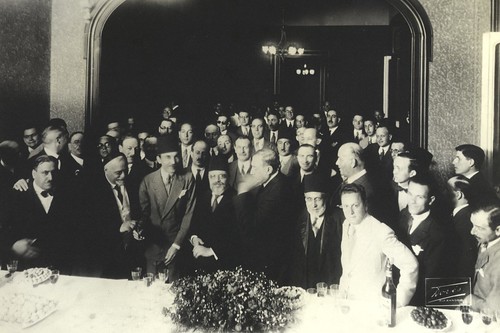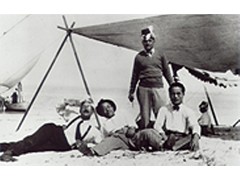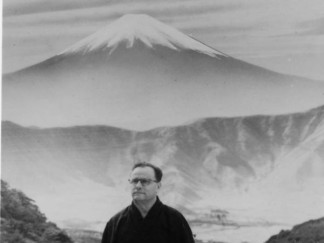From the Chicago Reader (June 19, 1992). There’s a new DVD box set devoted to five Berliner documentaries, including this one, that’s recently come out. — J.R.
INTIMATE STRANGER
*** (A must-see)
Directed and written by Alan Berliner.

The subject of Alan Berliner’s remarkable hour-long documentary, showing Friday night at Chicago Filmmakers, is his maternal grandfather, Joseph Cassuto — a Jew born in Palestine in 1905 and raised in Egypt, where he started working for the Japanese Cotton Trading Company in his teens. He moved his family to Brooklyn in 1941, shortly before Pearl Harbor, and after the war spent nearly all his time — roughly 11 months out of every year — in Japan, until late 1956, when he transferred to the New York office. He died in 1974.
Considering Cassuto’s globe-trotting, it’s hard to imagine most Americans being interested in Intimate Stranger. It’s taken the better part of a year for it to reach Chicago, after premiering last fall at the New York film festival. After all, this is a country so uninterested in the rest of the world that the foreign policies of its presidential candidates barely seem to matter — and when they do matter, you can bet it’s the welfare of this country rather than the planet that’s at issue. Moreover, Americans are so hostile to subtitled films — which are taken for granted all over the world, in places as diverse as Mexico, France, and Hong Kong — that currently only about 1 percent of the films shown here have subtitles. In fact, one could argue that it isn’t subtitles people hate (if it were, how could Dances With Wolves have been such a hit?) but foreign cultures; we love ourselves so much, to the exclusion of others, that we can’t bear the thought of others not feeling the same way. “It’s not gonna be Rain Man. It’s not gonna be One Flew Over the Cuckoo’s Nest. It’s not gonna be Steel Magnolias,” one of Berliner’s family members cautions the audience, while questioning why anyone would want to watch a movie about Joseph Cassuto. Who the hell was he, anyway?
A film about the mysteries of personality and the vagaries of memory, built on principles of both overload and absence, Intimate Stranger begins, ends, and proceeds with the sound and rhythms of typing, which are matched precisely to the rhythms of the film editing. A form of both punctuation and propulsion, the typewriting — often equated with thinking, speaking, and questioning — creates an artificial order out of a seemingly formless wealth of material. Again and again, each struck typewriter key corresponds to a shot in the film, and a machine-gun volley of clattering keys and shots implies not only sentences and film sequences but days and weeks, months and years and seasons, cities and countries and continents, children and friends, letters and stamps and envelopes, photographs and snapshots and home movies, newspapers and clippings — a profusion of things and events crowded into over 15 cartons of memorabilia, the film’s starting point. As a boy, Berliner was asked by his grandfather to help him put together — or sort through — these materials for an autobiography Cassuto wanted to write, Life of a Good Samaritan; in more ways than one this film is clearly Berliner’s completion of that duty, carried out with the help of many grateful friends and other family members still seething with questions and resentments. (“I never met anybody who disliked him — other than the immediate family,” says a family member. Another characteristic comment: “If I had met him not being his son, I’d have thought him one of the nicest people I ever met.”)
The voices of these friends and relatives, which we hear offscreen as often as we hear the typewriter keys, comprise a legato fugue that soars over the percussive, staccato timekeeping. Like the chorus of “witnesses” seen and heard throughout Warren Beatty’s Reds (1981), these voices weave a fragile and prismatic web of recollection and speculation around the subject. But while the voices and memories of the witnesses in Reds have a dialectical relationship to the film’s fictions about the historical figures of John Reed and Louise Bryant, the voices and memories of the witnesses here are played against a parade of physical evidence (letters, stamps, home movies, photographs). If the film’s montage suggests a filing system, its querulous narration by many voices repeatedly undermines that organization, converting evidence into doubts, facts into questions, souvenirs into quizzical complaints or uncertain tributes. (The complaints are all Brooklyn Jewish, the tributes are all Japanese, but the voices from Palestine and Egypt that might have comprised the third point of this spatiotemporal triangle — the middle point in space, the earliest point in time — are never heard, and have to be intuited from the photographs taken in Egypt.)
The major limitation of this highly accomplished film is that it doesn’t seem to expand with repeated viewings, either in its revelations and mysteries about Cassuto or in its form. After a certain point, the typing rhythms begin to seem more programmatic than musical, a compulsive manner of proceeding rather than a legitimate means of investigation. Cassuto himself remains a figure of conjecture, not because he was a person of infinite possibilities but because he was a businessman with little apparent identity beyond his work.
On the other hand, the wealth and variety of the home-movie and archival footage, which Berliner plays at different speeds and with various rhythms of stopping and resuming, are a continual source of fascination and pleasure. The same can be said of the recent footage shot for the film. My favorite passage is a montage of fragments of neon signs in Japan, beautifully composed and edited and set against Japanese music — a sequence with a kind of abstract beauty that surpasses anything the film may have to say or suggest about Joseph Cassuto.
Obviously a project like this one grows out of the necessity to resolve certain family issues as well as the “objective” desire to create a piece of art. By enlisting his whole family in the film’s polyphonic narration — some of which seems improvised and some written (though based, no doubt, on conversation) — Berliner appears to be laying the groundwork for a certain form of family group therapy. Whether or not the film serves this purpose is, of course, not the same as whether it tells a meaningful story to others.
Intimate Stranger manages to transcend its personal functions because it raises some haunting questions about the moral differences between professional life and home life. The larger question the film raises is whether or not Joseph Cassuto was a “good man,” and the answer to that question appears to be double-edged: he was a good man to his business associates but a rather bad man to his family. On the other hand, the Jewish patriarchal impulses that shape such questions may not be adequate in the long run to understanding who Cassuto was.
Significantly, the least resentful and reproachful of Cassuto’s relatives appear to be the women, at least judging by what they’re willing to express here. And the last voice we hear in the film offers the opinion that Cassuto’s wife Rose — who was born only a year later than he was and died four years later, in 1978 — was the family’s true hero. The film’s belated recognition of this possibility suggests that Berliner may have had to make this film in order to realize that the questions it poses may not invariably be the right ones.



